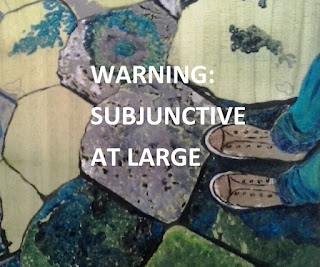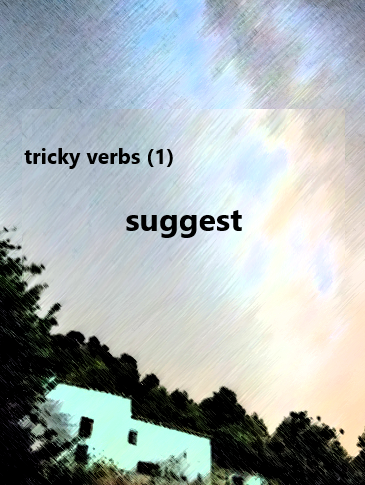WARNING: SUBJUNCTIVE AT LARGE
SPANISH SUBJUNCTIVE IN ENGLISH
Let me give you some good news: “In
English there are no subjunctive verb forms, almost”, which means you won’t
have to learn special verb forms. Now let me give you some very bad news: “In English there is subjunctive, as a content”. This is
terrible news, because it means that there is the content (order, suggestion,
wish, etc.) but not a specific form for that content. So, what do the English
do then? They do not express their orders, suggestions, wishes? Of course they do,
but to do it they have to resort to verbal forms that are also used to express other
“things”, other type of ideas, contents; in other words, to express
subjunctive, in general, they use verbal forms used to express “facts”
(indicative). And here lies the mess, the drama, the tragedy. Even in C1
(advanced) you can catch people happily matching a Spanish subjunctive with an
English verb form; and so it happens that while reading a beautiful piece of
writing suddenly you collide with the massive and horrifying “when I will arrive* home, I’ll …..” or
while listening to a good stretch of speaking all of a sudden there comes to your
ears the precisely ear-racking “I want
that she opens* the window”. And it is then and there
that you feel like either jumping out of the window and disappearing for good,
or staying in the classroom to strangle the undeniable and vexatious murderer
of languages. To avoid such a dilemma, I have thought of making a list of the
different verb forms that can be used as subjunctive in English; needless to
say they will be matched with the verbs, adjectives, conjunctions, structures,
etc. that introduce them.
Here you have an example of “your”
problem: the third person “comes” can be used in the indicative “She comes on
Mondays” (a fact), but also to express the Spanish subjunctive “When she comes
on Monday….”
Something
must be clear right from the beginning: 1) it is not the aim of this article to
be an exhaustive study of the subjunctive mood in Spanish-English; some
structures and verb forms must have escaped me, I’m not that smart. And 2) only
by having this information, you won’t speak better English (unless out you go
and practise). What is it meant for, then? I hope it will help you understand
the language you are trying to learn. For instance, that you should not
translate, but compare, and compare structures not isolated words; also, that
there is a subjunctive “content”, although there is not a subjunctive “form”. And
very important, that you may improve your writing, for, when writing, you have
more time to think, and it is easier for you to correct afterwards (see: this
last infinitive is subjunctive in Spanish).
1.
PAST
SIMPLE TENSE
A)
IN
CONDITIONAL SENTENCES
CONDITIONAL TYPE 2: if + past
/ present conditional
The “si you tuviera una escoba” type of subjunctive:
MIXED
CONDITIONAL (2/3 or 3/2) :
–Listen, if he spoke
Chinese that good he would have got
that job in Beijing last year.
–If she weren’t a good cook she wouldn’t have got the job in such a hotel.
B)
WISH
(verb)
The type “Ojala te fueras a casa que ya tengo sueño”
–I wish I knew what is going on out there
in our own street. But it beats me. (Time reference: present)
C)
AFTER / BEFORE
–No. I arrived at the party after he (had) left.
–Yeah.
I managed to arrive before
she (had) left.
D)
HOWEVER
Here we have something like
“por muy tarde que llegue…”
E)
WOULD
RATHER / WOULD SOONER
Something like “preferiría que vinieras otro día”
–I’ll
be working on the project all day. I’d rather you came tomorrow.
–I’d
sooner you left now. I feel like having a nap.
2.
PRESENT
SIMPLE TENSE
A)
IN
TIME CLAUSE
Beware, this is the very
popular “cuando llegue le diré un par de cosas”.
Please,
no: “when she will arrive….”
B)
WHOEVER
– WHEREVER – WHENEVER – WHATEVER – HOWEVER
Here we have the “dondequiera/quienquiera/cuandoquiera que vayas…”
type.
–I don’t know. We’ll go wherever
you want
to.
3.
PRESENT PERFECT
A)
HOPE
This is the “espero que mi hermano haya comprado los 5,832 globos for his birthday party…”
type of subjunctive.
B)
WHEN
4.
PAST
PERFECT
A)
WISH
Something
like “Ojalá hubiera
sabido…”.
5. 5.
PAST
PERFECT / PERFECT CONDITIONAL
A)
IN
CONDITIONAL SENTENCES
CONDITIONAL
TYPE 3: if + past
PERFECT / PERFECT conditional
The type of advice for Little Red Riding Hood (once she has been lunched by the Wolf, of course)
“si hubieras/hubieses ido por el caminito de siempre, no te habrías topado con el lobo”
B
) MIXED CONDITIONAL (2/3 or 3/2) : if
+ past
PERFECT/
conditional
6. 6. TO-INFINITIVE
S + V + NOUN/PRONOUN (as
object) + TO-INFINITIVE
Another
one like: “Quiero que vayas…”
becomes the very popular and absolutely disgusting “I want
A)
to
express “desire”
B)
to
express an order (or wish)
C) to
express persuasion/expectation/warning/instruction
·
I
persuaded my brother and her fiancée to wait
for me there.
·
They
convinced
my friends not
to tell anybody.
·
We
expect
them to
arrive at any minute.
·
They
warned him not to get near
the lions.
·
The
teacher instructed
the students to
leave the classroom without
running.
·
They
trained
him not to
make a noise when breaking into a
house.
·
He
himself directed
me to leave the room.
·
What
do you advise me to do?
D) to
express purpose/intention
·
I
didn’t mean
you to read it.
·
They
intended
him to break
into the house for them.
BEWARE:
Some of these verbs may take a “that + subjunctive/should clause” as, for
instance intend: “We intend that he
(should) paint it” (more formal). See
below “THAT CLAUSES”.
7. 7. FOR
+ TO-INFINITIVE:
The “Para que yo compre…” realization, whose English version is unfortunately squeezing its way into Spanish as the terrible and absolutely revolting “para yo comprar…”.
FOR + NOUN/PRONOUN (as object) + TO-INFINITIVE
·
It
was time for
them to leave.
·
It
was the season for the two brothers
to plough the land their
father had left them.
·
I
left the letter for Maggie to
read.
·
It
was for
you to decide.
·
The
sausages in the fridge were for you to eat
not (for you) to give
to the dog.
· It
was too cold
for them to leave
the warm and cosy room.
·
It
was too difficult
an essay for
him to meet the deadline.
·
It
was convenient
for John and Mary to buy the
house near the river.
8. 8. SHOULD
& BARE INFINITIVE
(infinitive
without “to”)
A)
in “THAT
CLAUSES” : After certain verbs
BEWARE: VERB BITES. This is the beautiful “sugiero que vayas…”. that brings about perplexity, doubt, and even unyielding argument. Note that probably because of the “want” or “advise” structures, one in class can hear the ear-racking and gallows deserving “I
SUBJECT + VERB + THAT …… (SHOULD)
INFINITIVE WITHOUT TO
·
She suggested that her daughter should stay at home all day.
or
·
She suggested
that
her daughter stay
at home all day. (Notice there’s no 3rd person
“s”)
·
My father suggested
that
the shop should be renewed.
or
·
My father suggested that the shop be renewed. (Don’t
panic: it’s the infinitive without “to”
which results from the omission of the modal verb “should”, and used to be the real subjunctive form in English).
·
The cruel
pirate commanded
that
the prisoners should be shot
then and there.
or
·
The cruel
pirate commanded
that
the prisoners be shot
then and there.
·
The
headmaster proposed that the students should go for
a swim instead of going to class.
or
·
The
headmaster proposed that the students go for a
swim instead of going to class.
Other
verbs: request, require, insist, recommend,
demand.
B) After
certain adjective
It
is/was + adjective +
that…. (should) infinitive without to
This is the “es
importante que
abras
la ventana …..
”
type.
·
It’s important
that
there should
be peace in the world.
or
·
It’s important
that
there be peace in the world.
·
It’s essential for the plan that he should arrive on time.
or
·
It’s essential for the plan that he arrive on time (No panicking: it’s
the infinitive without “to” once the
modal “should” has been omitted).
·
It is crucial
that
all the shares should
be sold before the end of the
year.
or
·
It is crucial that all the shares be sold
before the end of the year.
Other
similar adjectives: crucial, vital, central
(to something), advisable, strange, odd.
These and other similar adjectives admit an indicative
construction when you refer to a “fact”:
·
I’m afraid
he is
not at home. Phone later on, please. (He is not at home:
fact → indicative mood “is”)
·
As I walked
to his place I was still afraid that he should not be in (You do not know if he is or is not in
→ should, in Spanish: subjunctive)
Among others, I
have gone to the following books:
A Grammar of
Contemporary English,
Randolph Quirk et al.
A Practical
English Grammar,
Thompson, A.J. & Martinet, A.V.
Advanced
Grammar in Use,
Hewings, Martin.
The Subjunctive Affair in English, Nieto Marcó, Diego A. (the blogger)
and
dictionaries, the most useful of which has been the “Oxford Learners” third
edition (1974) for its very clear verb patterns.
For this teacher-author's books
click on this link




Comentarios
Publicar un comentario